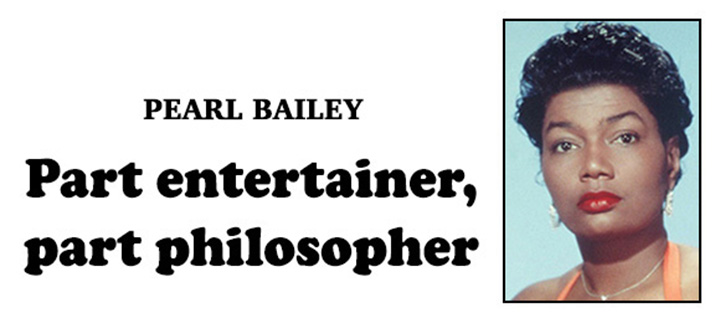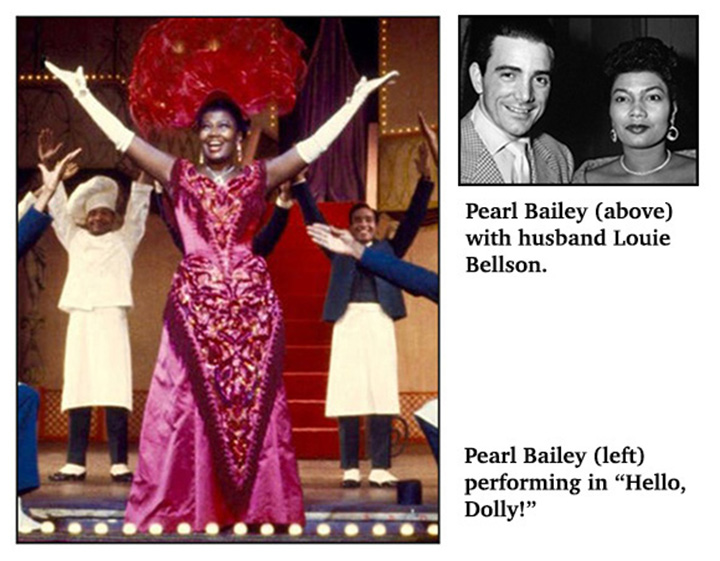Akron Beacon Journal, July 4, 1965
Pearl Bailey loves to philosophize — on any subject.
She loves it so much that she’s written a book.
“It started out as an autobiography,” she said, “but it’s turning into a philosophy book.”
Ms. Bailey was in Cleveland to co-host “The Mike Douglas Show.” It was one of the most talked-about weeks in the history of the show. Everyone, it seems, loves Pearl Bailey.
Her performance not only was refreshing, it was reassuring.
Only two months ago, a heart ailment forced her into a hospital, and for a few days it was feared the great singer-comedienne was close to death.
“OH, I WAS suffering from a severe heart strain, all right, but my condition wasn’t THAT serious. Some newspapers reported I had five heart attacks. Honey, that just isn’t true. Pearlie Mae didn’t have any heart attacks. My problem wasn’t the heart. It was the muscles around the heart.”
The robust Ms. Bailey bounced back quickly and took Cleveland by storm.
I was with her one afternoon, spending most of it at her feet while she engaged in her favorite sport — non-stop talking.
She was aglow with victory. She had just finished a session with attorney Melvin Belli, who had been a Douglas guest that afternoon. Ms. Bailey had out-talked the attorney — well, is there anyone she can’t out-talk? — and had scored a lopsided victory in the process. (I’m determining that victory by popular support. The audience was clearly behind her.)
Belli, the man who defended Jack Ruby, talked that day about his defense of Lenny Bruce, the comedian whose fondness for four-letter words has led to several arrests.
BELLI CONTENDS contends Bruce has a right to free speech, even vulgar speech.
Ms. Bailey tore into Belli, but not on any legal grounds.
“Honey, I have the legal right to go on stage and take off my clothes, but that doesn’t mean I should.” Then she chuckled and added, “Besides, who would want to see a tub of lard like me in the nude?”
She believes an entertainer can express himself through more subtle means. Anyone who has seen a Pearl Bailey performance knows she gets a point across with a lackadaisical shrug of her shoulders, a lazy wave of the hand, or a roll of the eyes.
She demonstrated for Belli by singing, “Row, Row, Row,” the tale of a young man who rows, rows, rows his boat until he and his girl friend are alone . . . at last!
“Honey, I don’t have to spell it out,” Ms. Bailey said as she interrupted the song to make a point with Belli. “The audience knows this here fella ain’t rowing for the fun of it.”
This kind of treatment, she says, is performing. Lenny Bruce, she contends, is not a performer.
HER DEFINITION of performing rules out many of today’s young entertainers.
“Most of them haven’t paid their dues,” she says. “They’re stars before they’ve earned that title. One hit record, and boom! They’re in the big time.
“The fact they can’t sing is bad enough. What’s worse is that few of them are prepared for failure. After their hit, they may have 10 flops, but they’re used to living high, so maybe they take to drinking or to dope. They give all performers a black eye.”
Ms. Bailey says old-time performers — “an old-timer is anyone over 30” — really had to work for success.
SHE ADMITS that old-timers at least had places to work. Today’s kids turn to the recording industry not only because it offers instant success, but because it is just about the only place they can start.
“I guess at one time there were about 3,000 nightclubs in this country,” she said, “but now there must be only 30. And the death of vaudeville years ago deprived young performers of another great opportunity.
“I’d like to see someone get vaudeville started again. Maybe if some of the great stars like Bob Hope and Jack Benny went on tour . . . well, honey, then today’s kids would find out what performing is really all about.
“I know it would be hard, but if vaudeville were handled correctly, it could become a success again.”
Her husband, who was seated nearby, nodded in agreement, but added the qualification, “It could only succeed if the five acts were book with movies like ‘Goldfinger.’ Otherwise, the people would probably stay home and watch television.”
THE MENTION of vaudeville made Ms. Bailey think back on the good old days, which, of course, were never really that good.
“Honey, us old folks are members of the world’s largest fraternity. We’ve all got something in common — we’ve lived on $1.25 a week and gone for days without having a roof over our heads.
“You might says we’ve slept together. That’s why there’s so little prejudice among performers.”
This led to a discussion of civil rights, or, as she put it, “human rights . . . I don’t like the expression ‘civil rights’ . . . it’s too cold.”
MS. BAILEY said she’s tired of the way the country adds laws. “We must be on our 15th Constitution by ow. I wish some day we’d get around to enforcing the first. That one gave us equal rights, didn’t it?”
Pearl Bailey, a 47-year-old African-American, has been married 13 years to Louis Bellson, a 41-year-old white jazz musician.
“We don’t call it a mixed marriage, honey. If we wanted to emphasize the difference . . . well, let me put it this way . . . anyone can find differences in a marriage . . . and if a person concentrates on those differences, the marriage will go down the drain. Louis and I have never thought about differences, especially the difference in the color of our skin.”
Ms. Bailey is not an active crusader in the civil rights struggle, but she has knocked down racial barriers in several Southern cities.
She accomplished this on tours with mixed groups of entertainers. Frequently her groups stayed in hotels that never before housed blacks.
“The key to our success was organization,” she claimed. “The hotels knew we were orderly.” She then suggested many cities have rebelled against civil rights workers, not out of prejudice, but because the workers invaded those cities like mobs.
THE ENTERTAINER has been victim of terrible examples of racism — once she was beaten by three men outside a nightclub — but nonetheless feels humanity is in good shape.
Prejudice, she said, stems from ignorance, and little by little ignorance is being chipped away.
She has done some of this chipping through her marriage. Many who fiercely oppose mixed marriages have softened their position upon meeting Mr. and Mrs. Bellson.
But philosopher Pearl always keeps her guard up.
As she walked toward the front door at WKYC after our interview, a switchboard operator handed Ms. Bailey a package that had been delivered to the station.
“You open it, honey,” said Ms. Bailey, handing the package back to the operator. “I haven’t been on any freedom marches lately, but I’m not taking any chances.”
That must have scared the operator, because she didn’t want the package, either. Finally, Bellson opened it — after listening for a ticking noise — and discovered it contained three dolls a Cleveland woman had made for Pearl’s children.
She was delighted, of course, but I’ll bet she still doesn’t open the next package someone tries to give her.
“God is good,” she said, “but some of His children got a long way to go.” |


